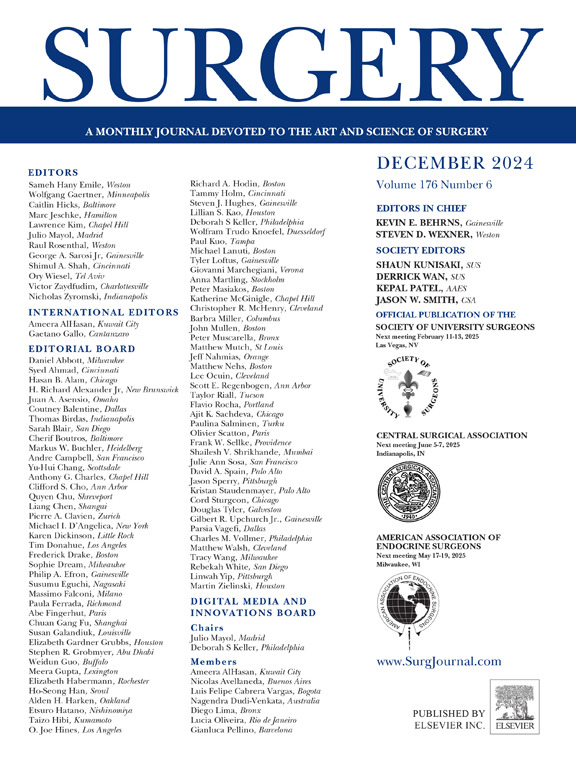紧急疝修补术后痴呆与不良后果的关系
IF 3.2
2区 医学
Q1 SURGERY
引用次数: 0
摘要
随着老年人口中痴呆症患病率的增加,其对手术结果的影响,特别是在紧急情况下,越来越受到关注。我们的目的是评估紧急疝修补术后痴呆与预后之间的关系。方法回顾性分析2016年至2021年全国再入院数据库中接受非择期疝修补术的患者(≥65岁)。患者根据先前存在的痴呆症进行分层。采用熵平衡和多变量回归来评估痴呆与住院死亡率、围手术期并发症、非家庭出院和非选择性30天再入院之间的风险调整相关性。结果在137,755例接受紧急疝修补术的患者中,8.2%患有痴呆。与其他患者相比,痴呆患者通常年龄较大(82.7 vs 76.1岁),女性较少(50.1 vs 53.0%),并且更频繁地参加医疗保险(94.0 vs 89.6%)(所有P <;. 05)。此外,他们有更大的合并症负担(Elixhauser指数:3 [2-5]vs 3[2-4]),包括精神疾病(17.8% vs 10.0%) (P <;. 05)。经过熵平衡和多变量调整后,痴呆与院内死亡风险增加相关(校正优势比为1.29;95%置信区间为1.12-1.49)。此外,痴呆与总体围手术期并发症的可能性较大独立相关(校正优势比,1.41;95%可信区间,1.32-1.50),非居家出院(校正优势比,2.98;95%可信区间,2.80-3.18)和再入院(调整优势比,1.11;95%置信区间为1.01-1.22)。结论痴呆与急诊疝修补术后预后较差有关,尤其是老年患者。我们的研究结果强调需要加强围手术期管理和有针对性的策略来优化这一人群的护理。本文章由计算机程序翻译,如有差异,请以英文原文为准。

Association of dementia with adverse outcomes after emergent hernia repair
Background
As the prevalence of dementia within an aging population increases, its impact on surgical outcomes, particularly in emergent settings, is a growing concern. We aimed to evaluate the association between dementia and outcomes after emergent hernia repair.
Methods
A retrospective analysis was performed of patients (≥65 years) undergoing nonelective hernia repair using the Nationwide Readmissions Database from 2016 to 2021. Patients were stratified on the basis of pre-existing dementia. Entropy balancing and multivariable regressions were used to assess the risk-adjusted association between dementia and in-hospital mortality, perioperative complications, nonhome discharge, and nonelective 30-day readmission.
Results
Of an estimated 137,755 patients undergoing emergent hernia repair, 8.2% had dementia. When compared with others, patients with dementia were generally older (82.7 vs 76.1 years), less commonly female (50.1 vs 53.0%) and more frequently insured by Medicare (94.0 vs 89.6%) (all P < .05). In addition, they had a greater burden of comorbidities (Elixhauser index: 3 [2–5] vs 3 [2–4]), including psychiatric disorders (17.8 vs 10.0%) (both P < .05). After entropy balancing and multivariable adjustment, dementia was associated with an increased risk of in-hospital mortality (adjusted odds ratio, 1.29; 95% confidence interval, 1.12–1.49). Additionally, dementia was independently associated with a greater likelihood of overall perioperative complications (adjusted odds ratio, 1.41; 95% confidence interval, 1.32–1.50), non-home discharge (adjusted odds ratio, 2.98; 95% confidence interval, 2.80–3.18), and readmission (adjusted odds ratio, 1.11; 95% confidence interval, 1.01–1.22).
Conclusion
Dementia appears to be associated with inferior outcomes after emergent hernia repair, especially among elderly patients. Our findings highlight the need for heightened perioperative management and targeted strategies to optimize care in this population.
求助全文
通过发布文献求助,成功后即可免费获取论文全文。
去求助
来源期刊

Surgery
医学-外科
CiteScore
5.40
自引率
5.30%
发文量
687
审稿时长
64 days
期刊介绍:
For 66 years, Surgery has published practical, authoritative information about procedures, clinical advances, and major trends shaping general surgery. Each issue features original scientific contributions and clinical reports. Peer-reviewed articles cover topics in oncology, trauma, gastrointestinal, vascular, and transplantation surgery. The journal also publishes papers from the meetings of its sponsoring societies, the Society of University Surgeons, the Central Surgical Association, and the American Association of Endocrine Surgeons.
 求助内容:
求助内容: 应助结果提醒方式:
应助结果提醒方式:


